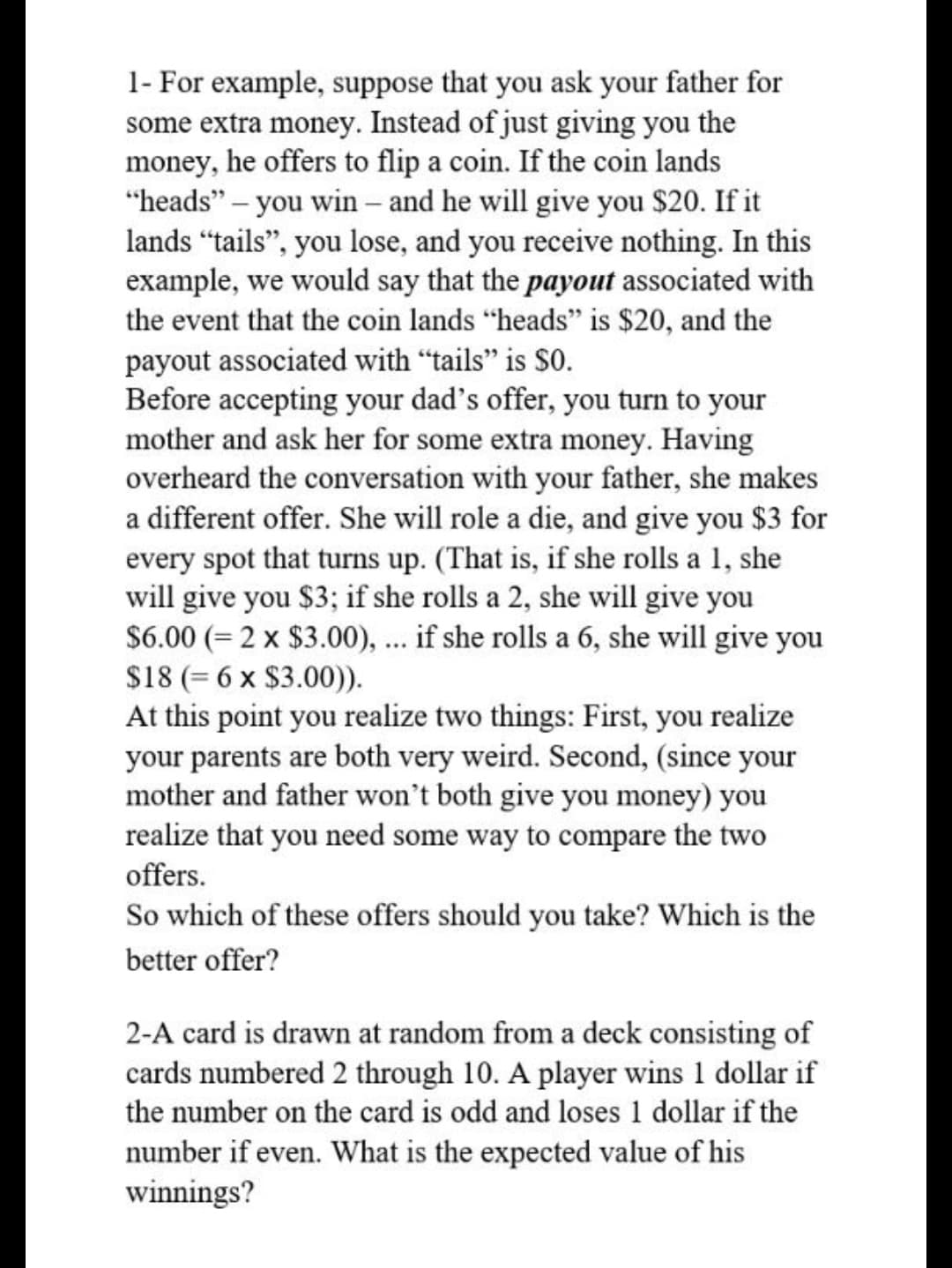1- For example, suppose that you ask your father for some extra money. Instead of just giving you the money, he offers to flip a coin. If the coin lands "heads" – you win – and he will give you $20. If it lands “tails", you lose, and you receive nothing. In this example, we would say that the payout associated with the event that the coin lands "heads" is $20, and the payout associated with "tails" is $0. Before accepting your dad's offer, you turn to your mother and ask her for some extra money. Having overheard the conversation with your father, she makes a different offer. She will role a die, and give you $3 for every spot that turns up. (That is, if she rolls a 1, she will give you $3; if she rolls a 2, she will give you $6.00 (= 2 x $3.00), ... if she rolls a 6, she will give you $18 (= 6 x $3.00)). At this point you realize two things: First, you realize your parents are both very weird. Second, (since your mother and father won't both give you money) you realize that you need some way to compare the two offers. So which of these offers should you take? Which is the better offer? 2-A card is drawn at random from a deck consisting of cards numbered 2 through 10. A player wins 1 dollar if the number on the card is odd and loses 1 dollar if the number if even. What is the expected value of his winnings?
1- For example, suppose that you ask your father for some extra money. Instead of just giving you the money, he offers to flip a coin. If the coin lands "heads" – you win – and he will give you $20. If it lands “tails", you lose, and you receive nothing. In this example, we would say that the payout associated with the event that the coin lands "heads" is $20, and the payout associated with "tails" is $0. Before accepting your dad's offer, you turn to your mother and ask her for some extra money. Having overheard the conversation with your father, she makes a different offer. She will role a die, and give you $3 for every spot that turns up. (That is, if she rolls a 1, she will give you $3; if she rolls a 2, she will give you $6.00 (= 2 x $3.00), ... if she rolls a 6, she will give you $18 (= 6 x $3.00)). At this point you realize two things: First, you realize your parents are both very weird. Second, (since your mother and father won't both give you money) you realize that you need some way to compare the two offers. So which of these offers should you take? Which is the better offer? 2-A card is drawn at random from a deck consisting of cards numbered 2 through 10. A player wins 1 dollar if the number on the card is odd and loses 1 dollar if the number if even. What is the expected value of his winnings?
College Algebra
7th Edition
ISBN:9781305115545
Author:James Stewart, Lothar Redlin, Saleem Watson
Publisher:James Stewart, Lothar Redlin, Saleem Watson
Chapter9: Counting And Probability
Section9.4: Expected Value
Problem 1E: If a game gives payoffs of $10 and $100 with probabilities 0.9 and 0.1, respectively, then the...
Related questions
Question

Transcribed Image Text:1- For example, suppose that you ask your father for
some extra money. Instead of just giving you the
money, he offers to flip a coin. If the coin lands
"heads" – you win – and he will give you $20. If it
lands “tails", you lose, and you receive nothing. In this
example, we would say that the payout associated with
the event that the coin lands "heads" is $20, and the
payout associated with "tails" is $0.
Before accepting your dad's offer, you turn to your
mother and ask her for some extra money. Having
overheard the conversation with your father, she makes
a different offer. She will role a die, and give you $3 for
every spot that turns up. (That is, if she rolls a 1, she
will give you $3; if she rolls a 2, she will give you
$6.00 (= 2 x $3.00), ... if she rolls a 6, she will give you
$18 (= 6 x $3.00)).
At this point you realize two things: First, you realize
your parents are both very weird. Second, (since your
mother and father won't both give you money) you
realize that you need some way to compare the two
offers.
So which of these offers should you take? Which is the
better offer?
2-A card is drawn at random from a deck consisting of
cards numbered 2 through 10. A player wins 1 dollar if
the number on the card is odd and loses 1 dollar if the
number if even. What is the expected value of his
winnings?
Expert Solution
This question has been solved!
Explore an expertly crafted, step-by-step solution for a thorough understanding of key concepts.
This is a popular solution!
Trending now
This is a popular solution!
Step by step
Solved in 3 steps

Recommended textbooks for you

College Algebra
Algebra
ISBN:
9781305115545
Author:
James Stewart, Lothar Redlin, Saleem Watson
Publisher:
Cengage Learning

College Algebra
Algebra
ISBN:
9781305115545
Author:
James Stewart, Lothar Redlin, Saleem Watson
Publisher:
Cengage Learning